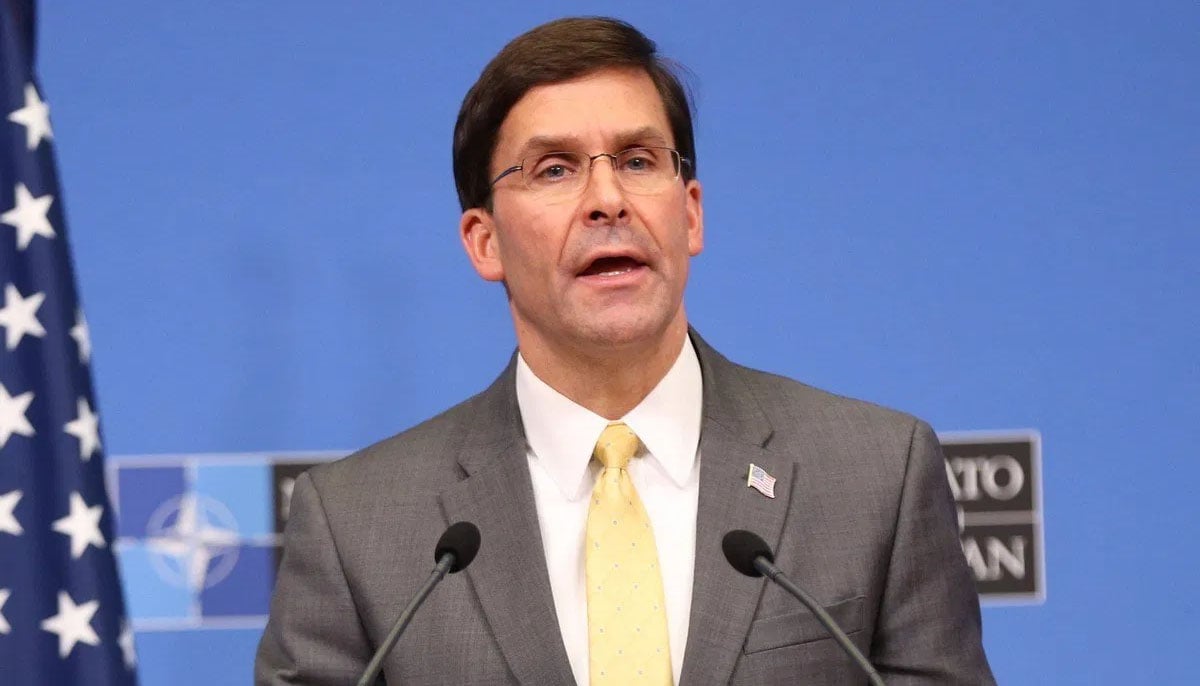US defence chief to visit China
US Defence Secretary Mark Esper plans to visit China for talks on how to improve two-way communications in a crisis as geopolitical tensions between the superpowers rise and concerns mount over a potential South China Sea flashpoint.
Esper said Monday that he hopes to make the trip before year-end to "establish the systems necessary for crisis communications and reinforce our intentions to openly compete in the international system in which we all belong."
Last week, the United States formally declared Beijing’s pursuit of territory and resources in South China Sea as illegal, explicitly backing the territorial claims of Southeast Asian countries against China’s. It has also downgraded relations with Hong Kong after China implemented a new security law in violation of its promises of autonomy to the territory.
"We are not in search of conflict," Esper said in an address to the International Institute of Strategic Studies. However, he said, China "has no right to turn international waters into a zone of exclusion for its own maritime empire."
Beijing has sought to make its claims to much of the South China Sea a de facto reality by building up small shoals and reefs into sizable military bases with long airstrips and deep port facilities. On July 2, the US Defence Department criticized Chinese military exercises around the Paracel Islands, saying they "further destabilise the situation" in an area also claimed by Taiwan and Vietnam. But two days later, the Pentagon said two of its own aircraft carriers had carried out drills in the South China Sea to "support a free and open Indo-Pacific," a spokesman said.
On July 13, Secretary of State Mike Pompeo voiced a challenge to China’s claims stronger than had previously come out of Washington. "The world will not allow Beijing to treat the South China Sea as its maritime empire," Pompeo declared in a statement.
"We are making clear: Beijing’s claims to offshore resources across most of the South China Sea are completely unlawful, as is its campaign of bullying to control them," Pompeo said. Esper outlined a number of examples of Chinese military behavior in East and Southeast Asia that the US objects to.
He cited the militarisation of contested South China Sea islands, the Chinese navy’s sinking of a Vietnamese fishing boat and harassment of Malaysian oil and gas activities, and its protecting fishing fleets that Indonesia says are illegally fishing in its waters.
He also pointed to the People’s Liberation Army’s recent exercises simulating an attack on Taiwan, increasing incursions into the waters around the Japanese administered Senkaku Islands, the new security law in Hong Kong, and its tolerance of North Korean trade in violation of a UN embargo. "Make no mistake, the CCP (Chinese Communist Party) has been engaged in this sort of behaviour for many years. But today it’s true intentions are on full display for all to see," said Esper.
-
 Blac Chyna Reveals Her New Approach To Love, Healing After Recent Heartbreak
Blac Chyna Reveals Her New Approach To Love, Healing After Recent Heartbreak -
 Royal Family's Approach To Deal With Andrew Finally Revealed
Royal Family's Approach To Deal With Andrew Finally Revealed -
 Super Bowl Weekend Deals Blow To 'Melania' Documentary's Box Office
Super Bowl Weekend Deals Blow To 'Melania' Documentary's Box Office -
 Meghan Markle Shares Glitzy Clips From Fifteen Percent Pledge Gala
Meghan Markle Shares Glitzy Clips From Fifteen Percent Pledge Gala -
 Melissa Jon Hart Explains Rare Reason Behind Not Revisting Old Roles
Melissa Jon Hart Explains Rare Reason Behind Not Revisting Old Roles -
 Meghan Markle Eyeing On ‘Queen’ As Ultimate Goal
Meghan Markle Eyeing On ‘Queen’ As Ultimate Goal -
 Kate Middleton Insists She Would Never Undermine Queen Camilla
Kate Middleton Insists She Would Never Undermine Queen Camilla -
 Japan Elects Takaichi As First Woman Prime Minister After Sweeping Vote
Japan Elects Takaichi As First Woman Prime Minister After Sweeping Vote -
 King Charles 'terrified' Andrew's Scandal Will End His Reign
King Charles 'terrified' Andrew's Scandal Will End His Reign -
 Winter Olympics 2026: Lindsey Vonn’s Olympic Comeback Ends In Devastating Downhill Crash
Winter Olympics 2026: Lindsey Vonn’s Olympic Comeback Ends In Devastating Downhill Crash -
 Adrien Brody Opens Up About His Football Fandom Amid '2026 Super Bowl'
Adrien Brody Opens Up About His Football Fandom Amid '2026 Super Bowl' -
 Barbra Streisand's Obsession With Cloning Revealed
Barbra Streisand's Obsession With Cloning Revealed -
 What Did Olivia Colman Tell Her Husband About Her Gender?
What Did Olivia Colman Tell Her Husband About Her Gender? -
 'We Were Deceived': Noam Chomsky's Wife Regrets Epstein Association
'We Were Deceived': Noam Chomsky's Wife Regrets Epstein Association -
 Patriots' WAGs Slam Cardi B Amid Plans For Super Bowl Party: She Is 'attention-seeker'
Patriots' WAGs Slam Cardi B Amid Plans For Super Bowl Party: She Is 'attention-seeker' -
 Martha Stewart On Surviving Rigorous Times Amid Upcoming Memoir Release
Martha Stewart On Surviving Rigorous Times Amid Upcoming Memoir Release




